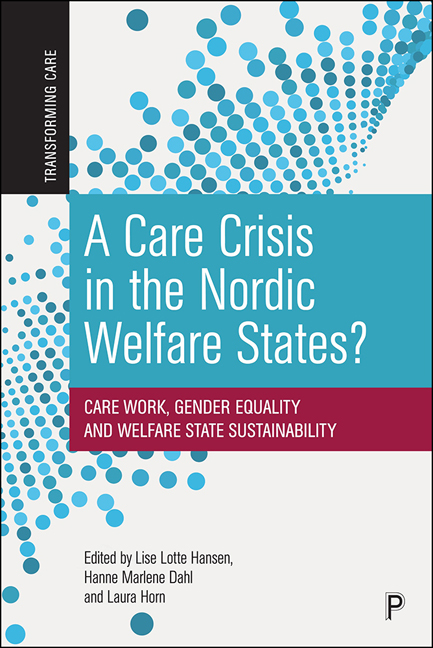 A Care Crisis in the Nordic Welfare States?
A Care Crisis in the Nordic Welfare States? Book contents
- Frontmatter
- Contents
- List of tables
- Notes on contributors
- Preface
- 1 Introduction: A care crisis in the Nordic welfare states?
- 2 The ‘care crisis’: its scientific framing and silences
- 3 Fraser’s care crisis theory meets the Nordic welfare societies
- 4 Crisis of care: a problem of economisation, of technologisation or of politics of care?
- 5 Deteriorating working conditions in elder care: an invisible crisis of care?
- 6 Managerialism as a failing response to the care crisis
- 7 ‘We are here for you’: the care crisis and the (un)learning of good nursing
- 8 Professionalisation of social pedagogues under managerial control: caring for children in a time of care crisis
- 9 Raising quality in Norwegian early childhood centres: (re)producing the care crisis?
- 10 Conclusion: Less caring and less gender-equal Nordic states
- 11 Postscript: A care crisis in the time of COVID-19
- Index
2 - The ‘care crisis’: its scientific framing and silences
Published online by Cambridge University Press: 13 May 2022
- Frontmatter
- Contents
- List of tables
- Notes on contributors
- Preface
- 1 Introduction: A care crisis in the Nordic welfare states?
- 2 The ‘care crisis’: its scientific framing and silences
- 3 Fraser’s care crisis theory meets the Nordic welfare societies
- 4 Crisis of care: a problem of economisation, of technologisation or of politics of care?
- 5 Deteriorating working conditions in elder care: an invisible crisis of care?
- 6 Managerialism as a failing response to the care crisis
- 7 ‘We are here for you’: the care crisis and the (un)learning of good nursing
- 8 Professionalisation of social pedagogues under managerial control: caring for children in a time of care crisis
- 9 Raising quality in Norwegian early childhood centres: (re)producing the care crisis?
- 10 Conclusion: Less caring and less gender-equal Nordic states
- 11 Postscript: A care crisis in the time of COVID-19
- Index
Summary
Introduction
The Nordic welfare regimes are often referred to as ‘caring states’ (Vabo and Szebehely, 2012), care-work-friendly (Wrede et al, 2008), social-democratic welfare regimes characterised by universalism (Esping-Andersen, 1990) and as potentially women-friendly welfare states (Hernes, 1987). However, major changes have taken place within these welfare regimes prompted by policies promoting neoliberalism and austerity. Neoliberalising has involved a wave of change with marketisation (contracting out) of elder care, self-responsibilising the elderly with concepts of ‘self-care’ and ‘reablement’ as well as the increasing amount of documentation, performance measurement and quality control in institutions providing care (Clarke and Newman, 1997; Meagher and Szebehely, 2013; Dahl et al, 2015; Dahl, 2017). Simultaneously, there are recurring recruitment problems with training and retaining sufficient numbers of professional carers for the elderly and for preschool children (Wrede et al, 2008; Danmarks Radio, 2018). Given these profound changes, the question arises as to how to describe these changes and their effects upon care.
A convenient term that has emerged to describe these trends is ‘care crisis’. The ‘care crisis’ concept was first introduced two decades ago by US sociologists (Phillips and Benner, 1994; Hochschild, 1995). The use of the term ‘crisis’ signals a derangement of matters, which can be thought of as relating to arrangements, decisions and beliefs (Wolin, 1969: 1080). While ‘care crisis’ can be seen as a useful shorthand for a wide gamut of trends, there are also risks in simply using a general, aggregate term and transferring an Anglo-American framing of care crisis into a different context. Scientific terms emerge in a specific milieu and academic disciplines, including terms describing care. Any care operates within its own unique welfare regimes. Hence, I decided to dig deeper and examine the original framing of a care crisis. By doing so, I position myself within the feminist tradition of self-reflexivity advocated by theorists such as Donna Haraway (1988) and Sandra Harding (1986). As the German sociologist Gudrun-Axeli Knapp has taught us, analytical concepts do not always travel easily across culturally and politically different contexts (2005) and in this particular case, the concept travels too easily but may be misleading in the new environment of Nordic welfare regimes.
- Type
- Chapter
- Information
- A Care Crisis in the Nordic Welfare States?Care Work, Gender Equality and Welfare State Sustainability, pp. 20 - 38Publisher: Bristol University PressPrint publication year: 2021
